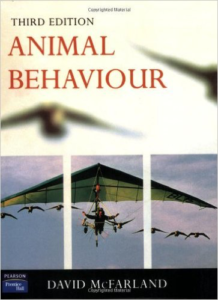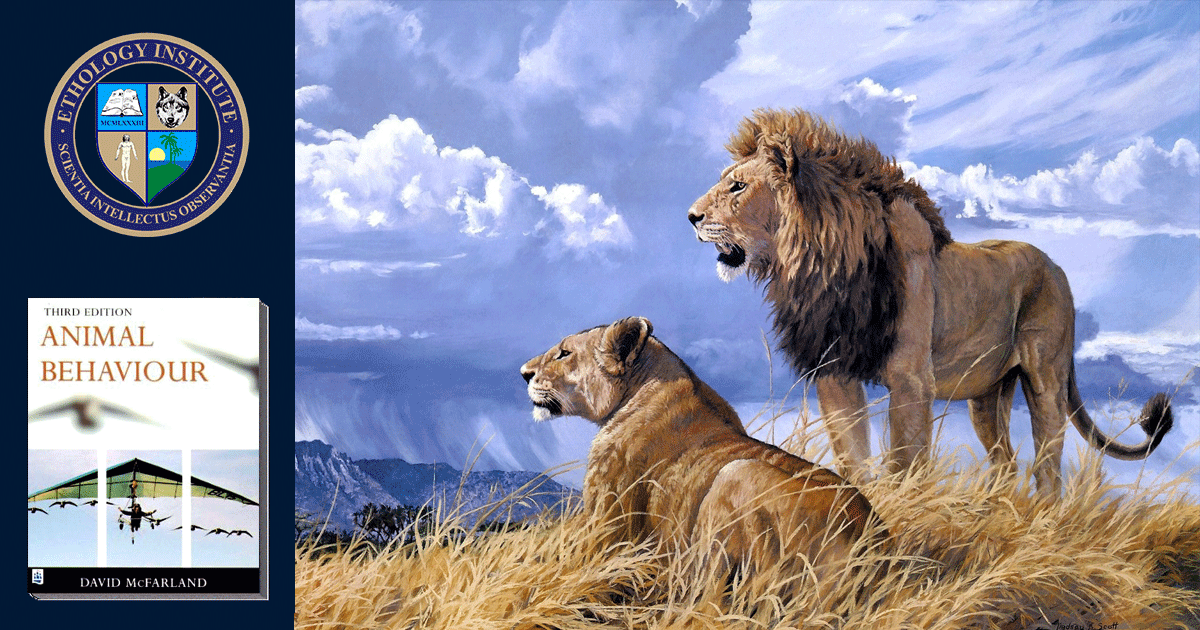Course Description
Evolution is the process of change in all forms of life over generations; Ethology is the study of animal behavior in the natural environment. This is a comprehensive and advanced course in evolution and ethology. Behavior as a tool in the struggle for survival and reproduction. It was Charles Darwin in his ‘The Origin Of Species By Means Of Natural Selection’ (1859) who first formulated the hypothesis that species evolved as a result of the struggle for life, i.e. as a result of natural selection, where the fittest had an advantage.
In this course, you’ll read David McFarland’s “Animal Behaviour” that you’ll have to acquire separately. If you arrived at this course via our program path, you have completed CPDT and CACE. You are, now, an advanced student of behavioral sciences. Therefore, we leave it more up to you to plan how best to take this course. We recommend you read the textbook and takes notes. You will need your notes to complete the lesson quiz and to write your course assignment. Sort out the most fundamental from the least. It’s a big book. Enjoy your reading. Your knowledge will increase with each page you read.
If you have a question that you’d like answered, or you find a topic especially challenging, feel free to ask in the course forum. This is true for all students and most of all for the student who arrives at this course without having previously taken any of our courses. In the course forum, our tutors will guide you and will answer your questions. We want you to feel confident that you know your stuff once you have earned your certificate. In distance education, lacking the personal contact of traditional classes, it is essential for student and tutors to keep in touch using all the means they have at their disposal. Our course forums are by far the best option.
PS—If you arrive at this course without having taken any previous courses, we strongly recommend you take Evolution and Ethology and then come back. These two courses are at the undergraduate level and easier than the current Evolution and Ethology, which is at the graduate level.
Course Level
Advanced. This is a course at the graduate level.
Course Textbook
“Animal Behaviour: Psychobiology, Ethology and Evolution”
by David McFarland, Ph.D.
Book contents
1. Introduction to the Study of Behaviour.
I. THE EVOLUTION OF BEHAVIOUR.
2. Genetics and Behaviour: Genes and Chromosomes: Development of Behaviour: Behaviour Genetics.
3. Natural Selection: Natural Selection, Ecology and Behaviour: Survival Value and Fitness: The Evolution of Adaptive Strategies.
4. Evolution and Social Behaviour: Sexual and Social Behaviour: Behavioural Ecology: Primate Social Behaviour.
II. MECHANISMS OF BEHAVIOUR.
5. Animal Perception: Neural Control of Behaviour: Sensory Processes and Perception: Ecology of the Senses.
6. The Animal and the Environment: Coordination and Orientation: Homeostasis and Behaviour: Physiology and Behavioural in Changing Environments.
7. Animal Learning: Conditioning and Learning: Biological Aspects of Learning: Cognitive Aspects of Learning.
III. UNDERSTANDING COMPLEX BEHAVIOUR.
8. Ethology: Instinct and Learning: Ritualization and Communication: Human Behaviour.
9. Animal Competence: The Complex Behaviour of Honey-Bees: Animal Economics: Animal Robotics.
10. The Mentality of Animals: Language and Mental Representation: Intelligence, Tools Use and Culture: Animal Awareness and Emotion.
- McFarland, D. (1998). Animal Behaviour: Psychobiology, Ethology and Evolution. Benjamin Cummings. 3rd ed.

Supplementary Literature
Although not mandatory, we recommend that you supplement your readings with:
- Darwin, C. (1859) On the origin of species by means of natural selection, or the preservation of favoured races in the struggle for life. London: John Murray. 1st ed.
- Dawkins, R. (2006) The Selfish Gene. Oxford University Press, USA.
- McFarland, D. (1982) The Oxford Companion to Animal Behaviour. Oxford University Press, Oxford.
- McFarland, D. (1998) Animal Behaviour. Benjamin Cummings. 3rd ed.
Online Studying and Tutoring
Watch the movie(s) and read the book(s). Join the course forum where you can read our tutors’ answers to questions previously posed by your colleagues. If you have a new question, do not hesitate in posting it.
The course forum is solely for academic questions. For administrative matters or difficulties accessing the functionality of the site, please submit a ticket.
Once you’re ready for it, take the quizzes. You may take a quiz as many times as you like. We recommend you re-take quizzes once a year as a self-imposed quality control.

